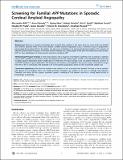| dc.contributor.author | Biffi, Alessandro | |
| dc.contributor.author | Plourde, Anna | |
| dc.contributor.author | Shen, Yiping | |
| dc.contributor.author | Onofrio, Robert | |
| dc.contributor.author | Smith, Eric E. | |
| dc.contributor.author | Frosch, Matthew P. | |
| dc.contributor.author | Prada, Claudia M. | |
| dc.contributor.author | Gusella, James Francis | |
| dc.contributor.author | Greenberg, Steven Mark | |
| dc.contributor.author | Rosand, Jonathan | |
| dc.date.accessioned | 2011-04-29T02:02:00Z | |
| dc.date.issued | 2010 | |
| dc.identifier.citation | Biffi, Alessandro, Anna Plourde, Yiping Shen, Robert Onofrio, Eric E. Smith, Matthew Frosch, Claudia M. Prada, James Gusella, Steven M. Greenberg, and Jonathan Rosand. 2010. Screening for Familial APP Mutations in Sporadic Cerebral Amyloid Angiopathy. PLoS ONE 5(11): e13949. | en_US |
| dc.identifier.issn | 1932-6203 | en_US |
| dc.identifier.uri | http://nrs.harvard.edu/urn-3:HUL.InstRepos:4879200 | |
| dc.description.abstract | Background: Advances in genetic technology have revealed that variation in the same gene can cause both rare familial and common sporadic forms of the same disease. Cerebral amyloid angiopathy (CAA), a common cause of symptomatic intracerebral hemorrhage (ICH) in the elderly, can also occur in families in an autosomal dominant pattern. The majority of affected families harbor mutations in the Beta amyloid Peptide (Aβ) coding region of the gene for amyloid precursor protein (APP) or have duplications of chromosomal segments containing APP. Methodology/Principal Findings: A total of 58 subjects with a diagnosis of probable or definite CAA according to validated criteria were included in the present study. We sequenced the Aβ coding region of APP in 58 individuals and performed multiplex ligation-dependent probe amplification to determine APP gene dosage in 60. No patient harbored a known or novel APP mutation or gene duplication. The frequency of mutations investigated in the present study is estimated to range from 0% to 8% in individuals with probable CAA in the general population, based on the ascertained sample size. Conclusions/Significance: We found no evidence that variants at loci associated with familial CAA play a role in sporadic CAA. Based on our findings, these rare highly-penetrant mutations are unlikely to be seen in sporadic CAA patients. Therefore, our results do not support systematic genetic screening of CAA patients who lack a strong family history of hemorrhage or dementia. | en_US |
| dc.language.iso | en_US | en_US |
| dc.publisher | Public Library of Science | en_US |
| dc.relation.isversionof | doi:10.1371/journal.pone.0013949 | en_US |
| dc.relation.hasversion | http://www.ncbi.nlm.nih.gov/pmc/articles/PMC2978718/pdf/ | en_US |
| dash.license | LAA | |
| dc.subject | genetics and genomics | en_US |
| dc.subject | complex traits | en_US |
| dc.subject | genetics of disease | en_US |
| dc.subject | neurological disorders | en_US |
| dc.subject | cerebrovascular disease | en_US |
| dc.subject | neurogenetics | en_US |
| dc.title | Screening for Familial APP Mutations in Sporadic Cerebral Amyloid Angiopathy | en_US |
| dc.type | Journal Article | en_US |
| dc.description.version | Version of Record | en_US |
| dc.relation.journal | PLoS ONE | en_US |
| dash.depositing.author | Gusella, James Francis | |
| dc.date.available | 2011-04-29T02:02:00Z | |
| dash.affiliation.other | HMS^Genetics | en_US |
| dc.identifier.doi | 10.1371/journal.pone.0013949 | * |
| dash.contributor.affiliated | Rosand, Jonathan | |
| dash.contributor.affiliated | Gusella, James | |
| dash.contributor.affiliated | Biffi, Alessandro | |
| dash.contributor.affiliated | Shen, Yiping | |
| dash.contributor.affiliated | Greenberg, Steven | |
| dash.contributor.affiliated | Frosch, Matthew | |


